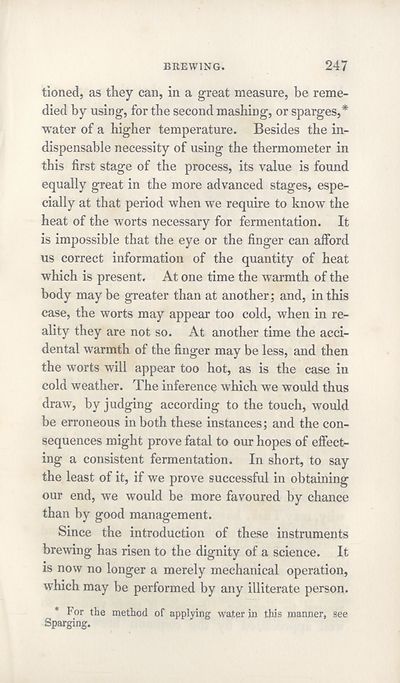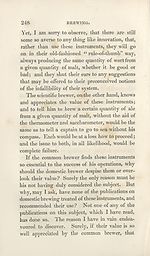Download files
Complete book:
Individual page:
Thumbnail gallery: Grid view | List view

BREWING.
247
tioned, as they can, in a great measure, be reme¬
died by using, for the second mashing, or sparges,*
water of a higher temperature. Besides the in¬
dispensable necessity of using the thermometer in
this first stage of the process, its value is found
equally great in the more advanced stages, espe¬
cially at that period when we require to know the
heat of the worts necessary for fermentation. It
is impossible that the eye or the finger can afford
us correct information of the quantity of heat
which is present. At one time the warmth of the
body may be greater than at another; and, in this
case, the worts may appear too cold, when in re¬
ality they are not so. At another time the acci¬
dental warmth of the finger may be less, and then
the worts will appear too hot, as is the case in
cold weather. The inference which we would thus
draw, by judging according to the touch, would
be erroneous in both these instances; and the con¬
sequences might prove fatal to our hopes of effect¬
ing a consistent fermentation. In short, to say
the least of it, if we prove successful in obtaining
our end, we would be more favoured by chance
than by good management.
Since the introduction of these instruments
brewing has risen to the dignity of a science. It
is now no longer a merely mechanical operation,
which may be performed by any illiterate person.
* For the method of applying water in this manner, see
Sparging.
247
tioned, as they can, in a great measure, be reme¬
died by using, for the second mashing, or sparges,*
water of a higher temperature. Besides the in¬
dispensable necessity of using the thermometer in
this first stage of the process, its value is found
equally great in the more advanced stages, espe¬
cially at that period when we require to know the
heat of the worts necessary for fermentation. It
is impossible that the eye or the finger can afford
us correct information of the quantity of heat
which is present. At one time the warmth of the
body may be greater than at another; and, in this
case, the worts may appear too cold, when in re¬
ality they are not so. At another time the acci¬
dental warmth of the finger may be less, and then
the worts will appear too hot, as is the case in
cold weather. The inference which we would thus
draw, by judging according to the touch, would
be erroneous in both these instances; and the con¬
sequences might prove fatal to our hopes of effect¬
ing a consistent fermentation. In short, to say
the least of it, if we prove successful in obtaining
our end, we would be more favoured by chance
than by good management.
Since the introduction of these instruments
brewing has risen to the dignity of a science. It
is now no longer a merely mechanical operation,
which may be performed by any illiterate person.
* For the method of applying water in this manner, see
Sparging.
Set display mode to:
![]() Universal Viewer |
Universal Viewer | ![]() Mirador |
Large image | Transcription
Mirador |
Large image | Transcription
| Antiquarian books of Scotland > Occupations > British wine-maker, and domestic brewer > (285) |
|---|
| Permanent URL | https://digital.nls.uk/126003341 |
|---|
| Description | Thousands of printed books from the Antiquarian Books of Scotland collection which dates from 1641 to the 1980s. The collection consists of 14,800 books which were published in Scotland or have a Scottish connection, e.g. through the author, printer or owner. Subjects covered include sport, education, diseases, adventure, occupations, Jacobites, politics and religion. Among the 29 languages represented are English, Gaelic, Italian, French, Russian and Swedish. |
|---|

